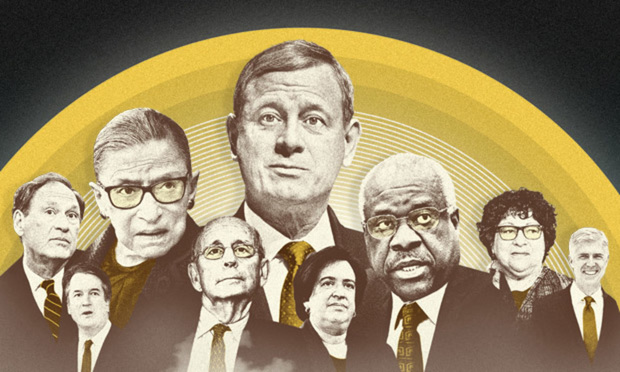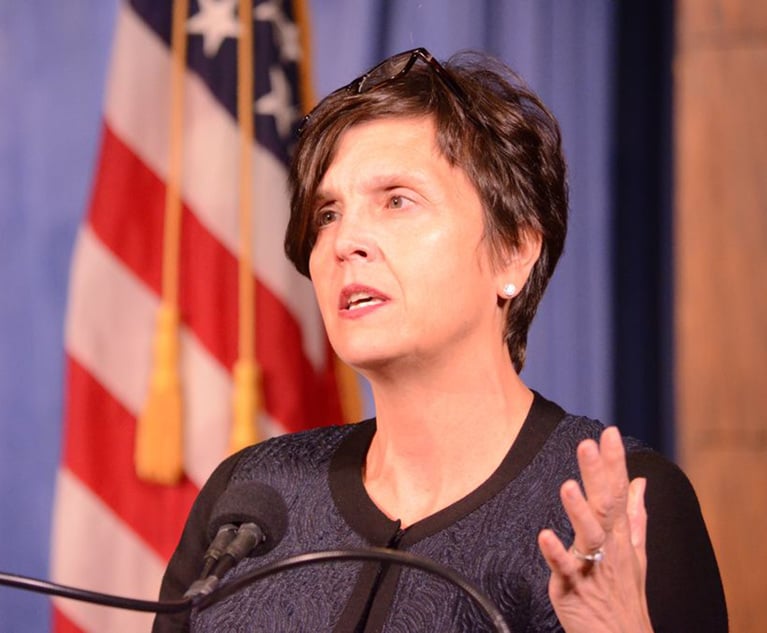At The Crossroads: A Look Ahead at the New U.S. Supreme Court Term
The new term begins Oct. 7. Marcia Coyle previews the biggest issues and most anticipated oral arguments in our annual preview.
August 26, 2019 at 09:57 AM
7 minute read

In a potentially momentous new U.S. Supreme Court term, guns, "dreamers," religious schools and LGBT workplace discrimination are among the issues confronting justices, issues likely to thrust the high court into the crucible of the 2020 presidential campaign season.
As the Roberts Court begins its 15th term on Oct. 7, Supreme Court scholars and others view the court as being in an important transitional period. Justice Anthony Kennedy, the crucial deciding vote in a number of divisive areas, is no longer on the court.
 Justice Elena Kagan testifies before the House Committee on Appropriations during a Supreme Court Budget hearing, on Thursday, March 7, 2019.
Justice Elena Kagan testifies before the House Committee on Appropriations during a Supreme Court Budget hearing, on Thursday, March 7, 2019.Justice Neil Gorsuch, starting his third full term, is staking out positions reflecting a libertarian streak in criminal law and an originalist approach second only to that of Justice Clarence Thomas. And Justice Brett Kavanaugh, who completed his first term, has yet to reveal where he will stand on a number of controversial issues.
With the exception of the partisan gerrymandering and census citizenship cases, the justices had a relatively low-key October 2018 term, which finished June 27.
"They had an astounding array of cases to choose from to fill the final eight argument slots of that term and they took none of them," said Erwin Chemerinsky, dean of the University of California Berkeley School of Law. "That was not a coincidence. After the bruising [Brett] Kavanaugh [confirmation] hearings, I think they tried to keep as low a profile as possible." The "unintended consequence" of that approach, he added, is that the court will be resolving high-profile, divisive cases in the spring of the 2020 election campaign. "In the long term, the court won't have a low profile," he predicted.
Last term left a number of significant, unanswered questions about where the court is headed. Will the unusual alignments of the justices—movements from right to left and left to right by a number of justices—continue?
- Who could step forward and be a "Kennedy" in the most divisive cases?
- Will the conservative block on the court harden into an even more conservative majority?
- Will the internal arguments over stare decisis and the role of precedent continue to divide the court, and if so, what precedents may be at risk?
- Will Justice Elena Kagan, who wrote vigorous dissents in the gerrymander and property rights cases, emerge as the leading voice on the left?
- Will the court be able to protect its legitimacy as it continues to face challenges related to the Trump presidency?
"There is a lot of pressure on the court and on [Chief Justice John] Roberts in particular," because of President Donald Trump's portrayal of the court "as essentially in his pocket," said Sarah Harrington, a partner at Goldstein & Russell, during a July 8 term review panel held at the University of California Irvine School of Law.
Here is a snapshot of some of the cases that are on the high court's docket:
Discrimination
The justices have consolidated two cases asking whether Title VII's ban on job discrimination "because of sex" includes sexual orientation. The cases are:
Altitude Express v. Zarda. Saul Zabell of Zabell & Associates, Bohemia, New York, represents Altitude Express; Gregory Antolinno of New York and Pamela Karlan of Stanford Law School are counsel to the Zarda estate; and Bostock v. Clayton County, Georgia. Brian Sutherland of Atlanta's Buckley Beal represents Bostock; John Hancock of Freeman, Mathis & Gary, Forest Park, Georgia, represents Clayton County.
 U.S. Solicitor General Noel Francisco
U.S. Solicitor General Noel FranciscoA third Title VII case asks whether the job bias ban prohibits discrimination against transgender persons based on their status as transgender or sex stereotyping under the high court decision in Price Waterhouse v. Hopkins.
The case is R.G. and G.R. Harris Funeral Homes v. EEOC and Aimee Stephens. James Campbell of Alliance Defending Freedom represents the Harris Funeral Homes. U.S. Solicitor General Noel Francisco represents the EEOC, and the ACLU's John Knight is counsel to Stephens.
Discrimination will also come up in another context. Comcast Corp. was sued by Entertainment Studios Networks, which claimed it couldn't get its channels on Comcast's cable systems because of racial discrimination. Comcast contends Section 1981, which bars racial discrimination in contracting, requires "but for" causation, not just a showing that race was a "motivating factor."
The case is Comcast v. National Association of African American-Owned Media. Gibson, Dunn & Crutcher partner Miguel Estrada represents Comcast, and Erwin Chemerinsky, dean of University of California Berkeley School of Law, represents the association.
Immigration
Immigration is back. The justices in three consolidated cases under Department of Homeland Security v. Regents, University of California will decide whether the Trump administration's decision to wind down the Deferred Action for Childhood Arrivals program is judicially reviewable and legal.
U.S. Solicitor General Noel Francisco represents Homeland Security; Covington & Burling partner Robert Long represents Regents; Gibson, Dunn & Crutcher partner Theodore Boutrous for Dulce Garcia group, and California Deputy Solicitor General Michael Mongan for states.
Constitutional Questions
New York City's ban on transporting a licensed, locked and unloaded gun to a home or shooting range outside city limits is challenged under the U.S. Constitution's Second Amendment, the Commerce Clause and the right to travel.
The case is New York State Rifle & Pistol Association v. City of New York. Kirkland & Ellis partner Paul Clement represents the rifle association, and Richard Dearing, executive assistant and chief of appeals for the New York City Law Department, represents the city.
The justices will also decide whether a Montana scholarship program which bars the use of its funds at religious schools, consistent with its state constitution, violates the U.S. Constitution's religion clauses or equal protection clause.
 Donald B. Verrilli, Jr. of Munger, Tolles & Olson.
Donald B. Verrilli, Jr. of Munger, Tolles & Olson.The case is Espinoza v. Montana Department of Revenue. Erica Smith of the Institute for Justice represents Espinoza; and Daniel Whyte, a Montana special assistant attorney general, represents the revenue department.
The justices consolidated five cases to review a decision by the U.S. Court of Appeals for the First Circuit, which held that the appointment of members of the Puerto Rico Financial Oversight and Management Board violated the appointments clause. The board is responsible for restructuring Puerto Rico's debt.
The case is Financial Oversight and Management Board v. Aurelius Investment. Munger, Tolles & Olson partner Donald Verrilli Jr. represents the board; and Gibson, Dunn & Crutcher partner Theodore Olson is counsel to Aurelius.
Water & ERISA
In County of Maui, Hawaii v. Hawaii Wildlife Fund, the justices agreed to decide whether the Clean Water Act requires a permit when pollutants originate from a point source but are conveyed to navigable waters by a nonpoint source, such as groundwater. Elbert Lin, a partner at Hunton Andrews Kurth, represents Maui; David Henkin of Earthjustice represents the Hawaii Wildlife Fund.
The high court will hear arguments on whether a participant in a defined benefit plan can bring a claim under the Employee Retirement Income Security Act for breach of fiduciary duty when the plan is overfunded. Thole v. U.S. Bank, N.A., is one of three ERISA cases before the justices this term. Peter Stris of Stris & Maher represents Thole and Joseph Palmore of Morrison & Foerster represents U.S. Bank.
This content has been archived. It is available through our partners, LexisNexis® and Bloomberg Law.
To view this content, please continue to their sites.
Not a Lexis Subscriber?
Subscribe Now
Not a Bloomberg Law Subscriber?
Subscribe Now
NOT FOR REPRINT
© 2025 ALM Global, LLC, All Rights Reserved. Request academic re-use from www.copyright.com. All other uses, submit a request to [email protected]. For more information visit Asset & Logo Licensing.
You Might Like
View All
Skadden and Steptoe, Defending Amex GBT, Blasts Biden DOJ's Antitrust Lawsuit Over Merger Proposal
4 minute read
'Lack of Independence' or 'Tethered to the Law'? Witnesses Speak on Bondi
4 minute read
Trending Stories
Who Got The Work
J. Brugh Lower of Gibbons has entered an appearance for industrial equipment supplier Devco Corporation in a pending trademark infringement lawsuit. The suit, accusing the defendant of selling knock-off Graco products, was filed Dec. 18 in New Jersey District Court by Rivkin Radler on behalf of Graco Inc. and Graco Minnesota. The case, assigned to U.S. District Judge Zahid N. Quraishi, is 3:24-cv-11294, Graco Inc. et al v. Devco Corporation.
Who Got The Work
Rebecca Maller-Stein and Kent A. Yalowitz of Arnold & Porter Kaye Scholer have entered their appearances for Hanaco Venture Capital and its executives, Lior Prosor and David Frankel, in a pending securities lawsuit. The action, filed on Dec. 24 in New York Southern District Court by Zell, Aron & Co. on behalf of Goldeneye Advisors, accuses the defendants of negligently and fraudulently managing the plaintiff's $1 million investment. The case, assigned to U.S. District Judge Vernon S. Broderick, is 1:24-cv-09918, Goldeneye Advisors, LLC v. Hanaco Venture Capital, Ltd. et al.
Who Got The Work
Attorneys from A&O Shearman has stepped in as defense counsel for Toronto-Dominion Bank and other defendants in a pending securities class action. The suit, filed Dec. 11 in New York Southern District Court by Bleichmar Fonti & Auld, accuses the defendants of concealing the bank's 'pervasive' deficiencies in regards to its compliance with the Bank Secrecy Act and the quality of its anti-money laundering controls. The case, assigned to U.S. District Judge Arun Subramanian, is 1:24-cv-09445, Gonzalez v. The Toronto-Dominion Bank et al.
Who Got The Work
Crown Castle International, a Pennsylvania company providing shared communications infrastructure, has turned to Luke D. Wolf of Gordon Rees Scully Mansukhani to fend off a pending breach-of-contract lawsuit. The court action, filed Nov. 25 in Michigan Eastern District Court by Hooper Hathaway PC on behalf of The Town Residences LLC, accuses Crown Castle of failing to transfer approximately $30,000 in utility payments from T-Mobile in breach of a roof-top lease and assignment agreement. The case, assigned to U.S. District Judge Susan K. Declercq, is 2:24-cv-13131, The Town Residences LLC v. T-Mobile US, Inc. et al.
Who Got The Work
Wilfred P. Coronato and Daniel M. Schwartz of McCarter & English have stepped in as defense counsel to Electrolux Home Products Inc. in a pending product liability lawsuit. The court action, filed Nov. 26 in New York Eastern District Court by Poulos Lopiccolo PC and Nagel Rice LLP on behalf of David Stern, alleges that the defendant's refrigerators’ drawers and shelving repeatedly break and fall apart within months after purchase. The case, assigned to U.S. District Judge Joan M. Azrack, is 2:24-cv-08204, Stern v. Electrolux Home Products, Inc.











